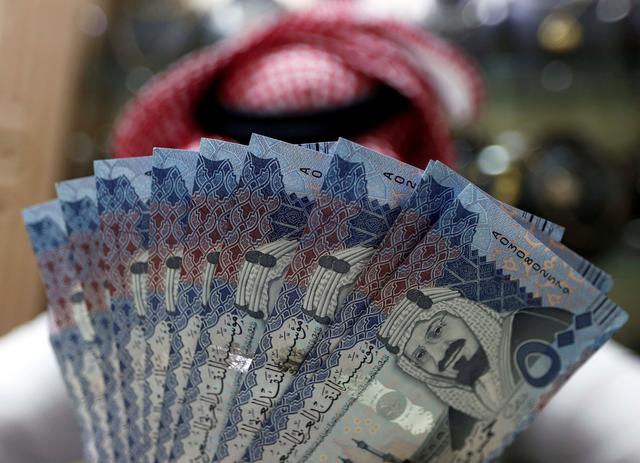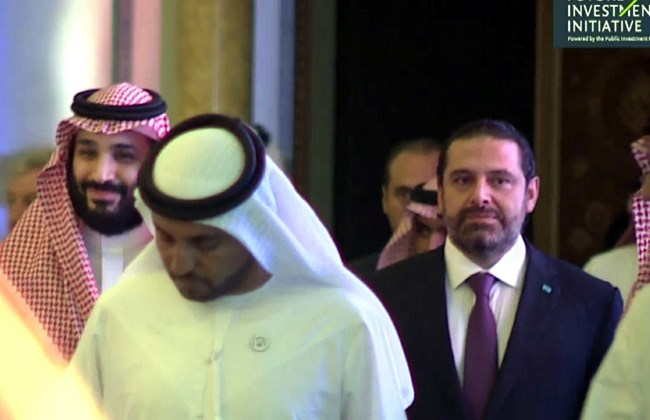angelburst29
The Living Force
October 21, 2018 - Turkey's Erdogan says to speak on Khashoggi case on Tuesday
Turkey's Erdogan says to speak on Khashoggi case on Tuesday | Reuters
Turkish President Tayyip Erdogan said he would make all the necessary statements about the killing of the Saudi journalist Jamal Khashoggi at a meeting with members of his ruling AK Party in parliament on Tuesday.
“I will make my statement about this issue on Tuesday at the party group meeting,” Erdogan said in a speech in Istanbul on Sunday, a day after Saudi Arabia said for the first time that Khashoggi had been killed at its consulate in Istanbul on Oct.2.
October 21, 2018 - Foreigners sell net $1.1 Billion of Saudi Stocks as journalist disappearance rattles investors
Foreigners sell net $1.1 billion of Saudi stocks as journalist disappearance rattles investors | Reuters

Foreigners sold a net 4.01 billion riyals ($1.07 billion) in Saudi stocks in the week ending Oct. 18, exchange data showed on Sunday - one of the biggest selloffs since the market opened to direct foreign buying in mid-2015.
The selloff came during a week when investors were rattled by Saudi Arabia’s deteriorating relations with foreign governments following the disappearance of journalist Jamal Khashoggi.
Riyadh said on Saturday that Khashoggi died in a fight inside its Istanbul consulate, its first acknowledgement of his death after denying for two weeks that it was involved in his disappearance.
A breakdown of the exchange data showed foreigners sold 5 billion riyals worth of stocks and bought 991.3 million worth.
“The market started to price in a fundamentally different relationship between Saudi Arabia and the U.S.,” said Jaap Meijer, head of equity research, at Arqaam Capital.
“We believe the U.S. will keep Saudi Arabia as its close ally given (amongst other things) the importance of the kingdom in the Middle East region and being the producer of 10 percent of the world oil supply.”
U.S. Treasury Secretary Steven Mnuchin said on Sunday that Saudi Arabia’s explanation of the killing of journalist Jamal Khashoggi was a “good first step but not enough”, adding it was premature to discuss any sanctions against Riyadh over the incident.
The comments were the latest from the administration of U.S. President Donald Trump that appear aimed at censuring a killing that has sparked global outrage, while protecting relations with the world’s top oil exporter.
The stock exchange data also showed Saudi individual investors such as retail investors and high net worth individuals sold a net 3.4 billion riyals worth of stocks during the week, however Saudi institutions bought a net 7.8 billion riyals worth of stocks. Investors from other Gulf countries were also net sellers.
Market analysts told Reuters last week that state-linked funds appeared to have mounted an operation to support the stock market after heavy foreign selling.
The Saudi stock market is down about 4 percent since Khashoggi disappeared on Oct 2. The market had already started to weaken before the incident as foreign funds slowed their buying after MSCI’s announcement in June that the kingdom will be included in its global emerging market benchmark next year.
The Saudi index closed up 0.2 percent on Sunday after falling as much as 3.5 percent earlier in the session.
Saudi Arabia’s foreign debt has also been pressured, with yields rising across the the country’s dollar bond curve.
The yield on Saudi Arabia’s $5.5 billion bond due in 2026 and $6.5 billion note due in 2046 rose to record highs last week, according to Refinitiv data.
Saudi credit default swaps, which investors buy as protection against default, rose to 100 basis points late last week for the first time since June, data from IHS Markit showed.
October 21, 2018 - Saudi King and Crown Prince call Khashoggi's Son to express condolences: SPA
Saudi king and crown prince call Khashoggi's son to express condolences: SPA | Reuters
Saudi King Salman and Crown Prince Mohammed bin Salman called slain Saudi journalist Jamal Khashoggi’s son, Salah, to express their condolences, the Saudi Press Agency said late on Sunday.
Saudi Arabia has said that Khashoggi, a prominent journalist and critic of Saudi rulers, died in a fight inside its Istanbul consulate - after two weeks of denials that it had anything to do with his disappearance.
October 20, 2018 - Saudi Senior Scholars praise King's decisions on Khashoggi Death
Saudi senior scholars praise king's decisions on Khashoggi death | Reuters
Saudi Arabia’s highest religious body, the Council of Senior Scholars, on Saturday said the king’s decisions on the death of Jamal Khashoggi “achieve justice and equality in accordance with Islamic law”, according to a statement on state news agency SPA.
Saudi Arabia has admitted that Khashoggi, a prominent journalist, died in a fight inside its Istanbul consulate - after two weeks of denials that it had anything to do with his disappearance - and dismissed five officials over the incident.
Turkey's Erdogan says to speak on Khashoggi case on Tuesday | Reuters
Turkish President Tayyip Erdogan said he would make all the necessary statements about the killing of the Saudi journalist Jamal Khashoggi at a meeting with members of his ruling AK Party in parliament on Tuesday.
“I will make my statement about this issue on Tuesday at the party group meeting,” Erdogan said in a speech in Istanbul on Sunday, a day after Saudi Arabia said for the first time that Khashoggi had been killed at its consulate in Istanbul on Oct.2.
October 21, 2018 - Foreigners sell net $1.1 Billion of Saudi Stocks as journalist disappearance rattles investors
Foreigners sell net $1.1 billion of Saudi stocks as journalist disappearance rattles investors | Reuters
Foreigners sold a net 4.01 billion riyals ($1.07 billion) in Saudi stocks in the week ending Oct. 18, exchange data showed on Sunday - one of the biggest selloffs since the market opened to direct foreign buying in mid-2015.
The selloff came during a week when investors were rattled by Saudi Arabia’s deteriorating relations with foreign governments following the disappearance of journalist Jamal Khashoggi.
Riyadh said on Saturday that Khashoggi died in a fight inside its Istanbul consulate, its first acknowledgement of his death after denying for two weeks that it was involved in his disappearance.
A breakdown of the exchange data showed foreigners sold 5 billion riyals worth of stocks and bought 991.3 million worth.
“The market started to price in a fundamentally different relationship between Saudi Arabia and the U.S.,” said Jaap Meijer, head of equity research, at Arqaam Capital.
“We believe the U.S. will keep Saudi Arabia as its close ally given (amongst other things) the importance of the kingdom in the Middle East region and being the producer of 10 percent of the world oil supply.”
U.S. Treasury Secretary Steven Mnuchin said on Sunday that Saudi Arabia’s explanation of the killing of journalist Jamal Khashoggi was a “good first step but not enough”, adding it was premature to discuss any sanctions against Riyadh over the incident.
The comments were the latest from the administration of U.S. President Donald Trump that appear aimed at censuring a killing that has sparked global outrage, while protecting relations with the world’s top oil exporter.
The stock exchange data also showed Saudi individual investors such as retail investors and high net worth individuals sold a net 3.4 billion riyals worth of stocks during the week, however Saudi institutions bought a net 7.8 billion riyals worth of stocks. Investors from other Gulf countries were also net sellers.
Market analysts told Reuters last week that state-linked funds appeared to have mounted an operation to support the stock market after heavy foreign selling.
The Saudi stock market is down about 4 percent since Khashoggi disappeared on Oct 2. The market had already started to weaken before the incident as foreign funds slowed their buying after MSCI’s announcement in June that the kingdom will be included in its global emerging market benchmark next year.
The Saudi index closed up 0.2 percent on Sunday after falling as much as 3.5 percent earlier in the session.
Saudi Arabia’s foreign debt has also been pressured, with yields rising across the the country’s dollar bond curve.
The yield on Saudi Arabia’s $5.5 billion bond due in 2026 and $6.5 billion note due in 2046 rose to record highs last week, according to Refinitiv data.
Saudi credit default swaps, which investors buy as protection against default, rose to 100 basis points late last week for the first time since June, data from IHS Markit showed.
October 21, 2018 - Saudi King and Crown Prince call Khashoggi's Son to express condolences: SPA
Saudi king and crown prince call Khashoggi's son to express condolences: SPA | Reuters
Saudi King Salman and Crown Prince Mohammed bin Salman called slain Saudi journalist Jamal Khashoggi’s son, Salah, to express their condolences, the Saudi Press Agency said late on Sunday.
Saudi Arabia has said that Khashoggi, a prominent journalist and critic of Saudi rulers, died in a fight inside its Istanbul consulate - after two weeks of denials that it had anything to do with his disappearance.
October 20, 2018 - Saudi Senior Scholars praise King's decisions on Khashoggi Death
Saudi senior scholars praise king's decisions on Khashoggi death | Reuters
Saudi Arabia’s highest religious body, the Council of Senior Scholars, on Saturday said the king’s decisions on the death of Jamal Khashoggi “achieve justice and equality in accordance with Islamic law”, according to a statement on state news agency SPA.
Saudi Arabia has admitted that Khashoggi, a prominent journalist, died in a fight inside its Istanbul consulate - after two weeks of denials that it had anything to do with his disappearance - and dismissed five officials over the incident.



